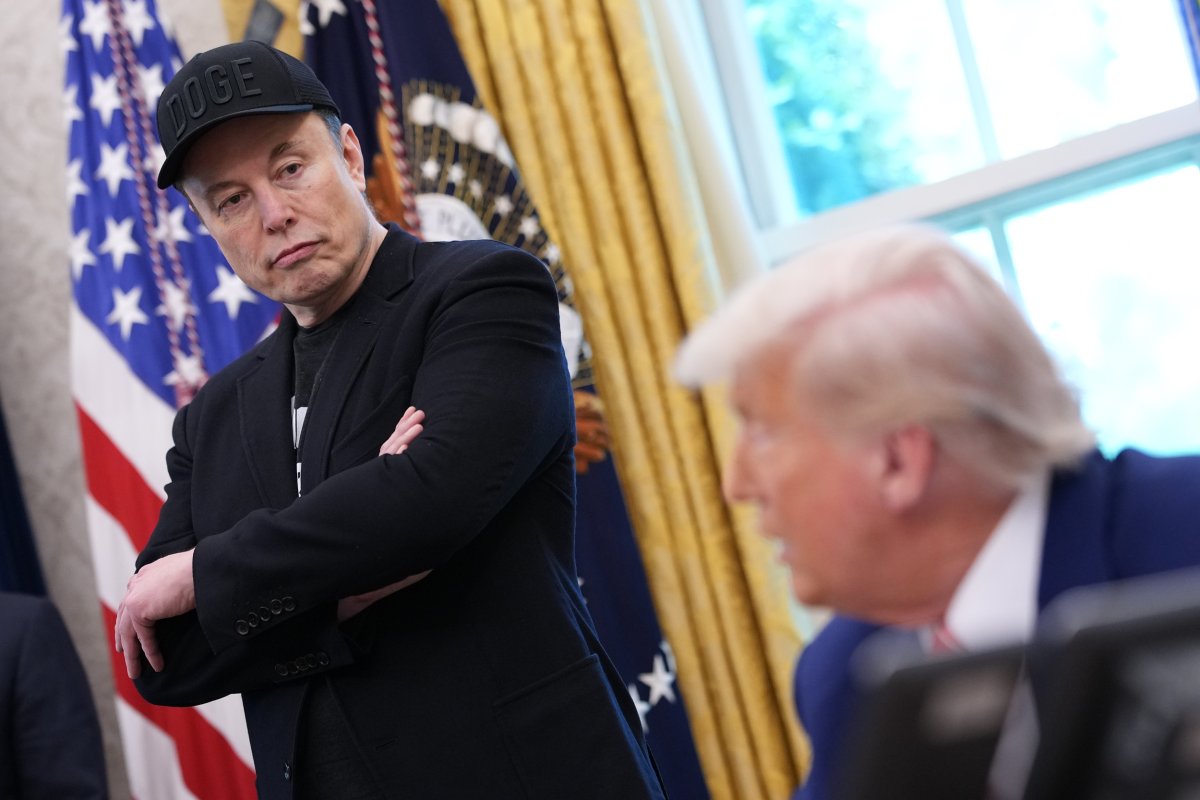President Donald Trump and billionaire Elon Musk are embroiled in a new public spat over the much-debated financial package dubbed the “big, beautiful bill,” which led to the Tesla CEO threatening to support primary challengers against Republicans who vote in favor of the sprawling federal budget proposal.
Several analysts talked with Newsweek about repercussions the GOP could face if Musk follows through on his threat.
Why It Matters
Musk’s intervention comes at a volatile moment: The attempted passage of Trump’s fiscal initiative—the centerpiece of his legislative efforts—agonized party traditionalists and grassroots activists who have long campaigned on promises of fiscal restraint.
Clashes over the bill also underscore significant fractures within the Republican Party as it aims to hold control of Congress amid mounting pressure from both establishment leaders and populist outsiders.
Musk’s threat to back the unseating of officeholders deviating from fiscal conservatism raises questions about grassroots accountability, donor influence and the enduring sway of Trump within GOP ranks.
On Tuesday after a marathon “vote-a-rama,” the Senate narrowly passed the bill, with a tiebreaking vote from Vice President JD Vance, sending it back to the House for final deliberations.

Photo-illustration by Newsweek/Getty/Canva
What To Know
Political science professor at Columbia University, Robert Y. Shapiro, told Newsweek via email Tuesday night that Trump’s political clout “is still strong” despite the fervent attacks from Musk.
“His has been strengthened by the big win he can claim in the attack on Iran’s nuclear sites. This did not improve his approval rating but that rating has held up thanks to the strong support from his MAGA base and other Republicans. Trump’s party has minimal control of the Senate and the House, and Vance having to cast the deciding vote was not a sign of weakness but showed Trump’s strength with Thune in holding majority support together in the Senate,” Shapiro said.
The political science professor added, “Do not be surprised to see the same in the House,” while saying the Musk’s political power is “limited.”
“His behavior is all theatrics,” Shapiro said about Musk. “As is Trump’s but Trump also still has the cards here. The biggest threat to Trump is if he can’t get the bill passed in the House now after plowing it through the Senate, and if his tariffs and other erratic economic rhetoric and actions destabilize the economy. These could have repercussions as we move toward 2026 and the midterm elections — but these are still far off.”
Musk has not shied away from blasting the piece of legislation backed by the president. In a Monday post to X, formerly Twitter, Musk said, “Every member of Congress who campaigned on reducing government spending and then immediately voted for the biggest debt increase in history should hang their head in shame! And they will lose their primary next year if it is the last thing I do on this Earth.”
D. Stephen Voss, political science professor at the University of Kentucky, told Newsweek via email Tuesday night, “Musk speaks for a small but influential faction within the Republican electorate, to a degree the same faction responsible for the rise of Liberty Republicans like Sen. Rand Paul and Rep. Thomas Massie. An endorsement from Musk could help such candidates in GOP primaries, especially if the support comes with sufficient financial backing to mount a serious campaign. Hard to say whether that would be a problem for Trump or the Republicans, though.”
Voss added that “robust” primaries don’t necessarily “hurt” Republicans or Democrats but could “drain resources and sometimes cause bad blood.” He did, however, highlight that they do get voters “engaged” by registering to vote, and in the practice of participating.
Musk-backed candidates who win would have to “operate effectively within Congress,” Voss says, while adding that it usually means compromise.
“In terms of Trump losing clout: Trump is riding high within the Republican Party right now, so anyone who challenges him – from inside or outside the government – is running into the wind,” Voss said. “Should Trump’s job approval persist at rock-bottom levels, though, then breaking from him early could pay off, especially if Republicans suffer in the 2026 midterm elections. Eventually we’ll see various Republicans fighting to define the future of the Republican Party, and who rises in that contest will be shaped by Trump’s record over the next couple of years.”

Tesla CEO Elon Musk looks on as President Donald Trump speaks to reporters in the Oval Office of the White House on May 30 in Washington, D.C. (Photo by Kevin Dietsch/Getty Images)
Tesla CEO Elon Musk looks on as President Donald Trump speaks to reporters in the Oval Office of the White House on May 30 in Washington, D.C. (Photo by Kevin Dietsch/Getty Images)
Grant Davis Reeher, professor of political science at Syracuse University, told Newsweek on Wednesday, “My sense—just a sense, no data to bolster it—is that with his absence from the administration, Musk is beginning to fade in political influence.”
Reeher added: “He and Trump have patched up some of the worst aspects of their earlier falling out. The notion of a ‘feud’ is back in the news, but I don’t see this dragging on as a running drama. Musk in particular doesn’t have much to gain from that, but he does have much to lose. He wants to see government much smaller than it is, and if he wants to pursue that goal through political involvement, fighting with Democrats makes much more sense than fighting with Republicans.”
After Musk left his post heading the Department of Government Efficiency (DOGE) in May, he denounced the piece of legislation and also hurled public accusations at the president, including, “Time to drop the really big bomb: @realDonaldTrump is in the Epstein files. That is the real reason they have not been made public. Have a nice day, DJT!”
Trump on Tuesday also floated the idea of Musk heading back to his native South Africa if the president halted government subsidies for his companies, adding later that his administration may even “have to take a look” at deporting the billionaire.
Musk reacted to Trump’s comment on Wednesday, calling it “so disappointing.”
What People Are Saying
Musk posted to X on Tuesday: “What’s the point of a debt ceiling if we keep raising it?”
Trump, on Truth Social early Tuesday morning: “Elon Musk knew, long before he so strongly Endorsed me for President, that I was strongly against the EV Mandate. It is ridiculous, and was always a major part of my campaign. Electric cars are fine, but not everyone should be forced to own one. Elon may get more subsidy than any human being in history, by far, and without subsidies, Elon would probably have to close up shop and head back home to South Africa. No more Rocket launches, Satellites, or Electric Car Production, and our Country would save a FORTUNE. Perhaps we should have DOGE take a good, hard, look at this? BIG MONEY TO BE SAVED!!!”
What Happens Next
The aftermath of Musk’s threat will likely unfold over time, as candidate filings approach for next year’s midterms.
Primary challengers backed by well-resourced figures remain a wild card for Republican leadership and could prompt incumbents to recalibrate fiscal messaging.
